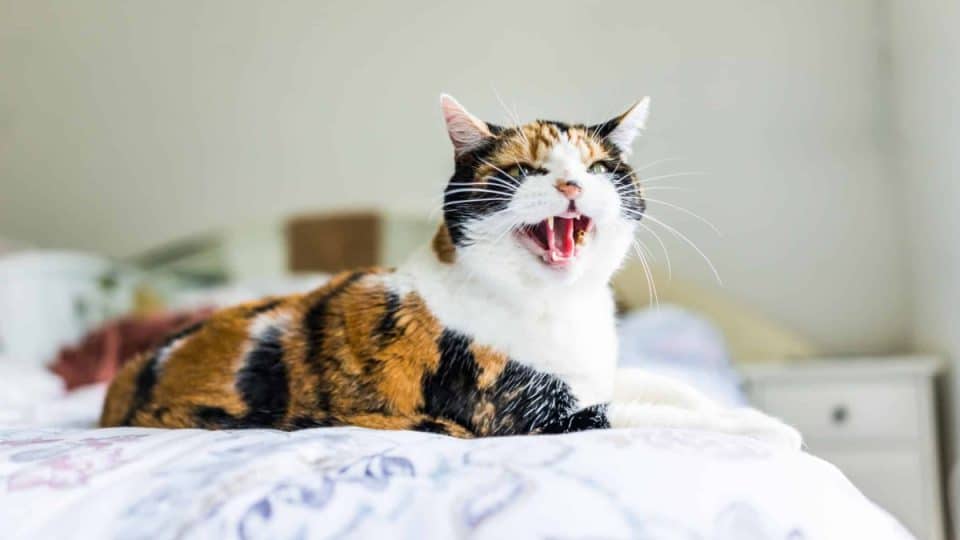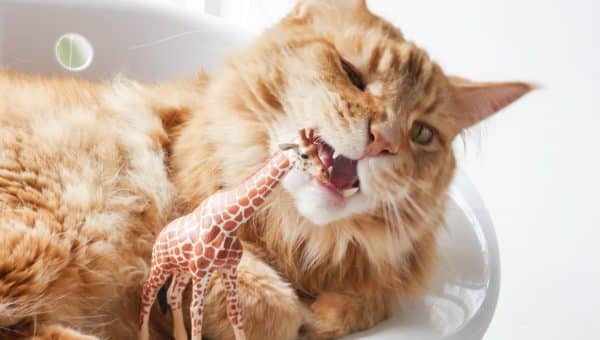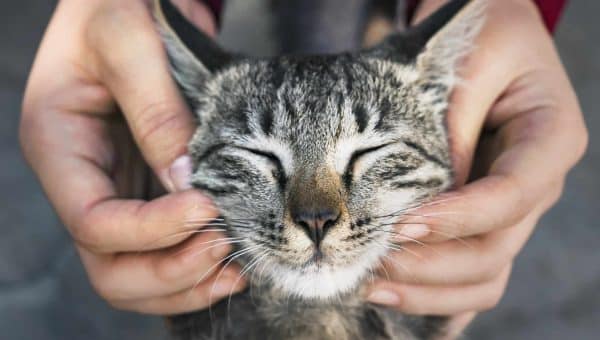- Not a substitute for professional veterinary help.
A cat’s body language isn’t always easy to decipher; sometimes, we misinterpret their mixed signals. But there’s one signal we hear loud and clear: A cat’s hiss. Cats hiss to warn someone or something to back away. It’s a defensive sound, alongside growling, yowling, and spitting. But unlike other feline vocalizations, hissing is involuntary—a natural reaction when they’re frightened, surprised, or experiencing sudden pain or discomfort.
If a cat hisses at you, it doesn’t mean they don’t like you. “It’s about being fearful, stressed, anxious, or conflicted,” explains Stephen Quandt, a certified Feline Training and Behavior Specialist (CFTBS). If a cat hisses at you, pay close attention to their body language; they either need space to de-stress or an appointment with the vet.
Here’s your guide for decoding a cat’s harrowing hiss.
5 Why Reasons Cats Hiss
When cats hiss, their mouths open in a snarl, their razor-sharp teeth exposed. It’s a defensive stance, and when not taken seriously, an attack could follow. Feline behaviorist Jane Ehrlich says cats “loathe the terrible c’s: having no control, having no choice, and change.” Any combination of the terrible c’s and the emotions they provoke could trigger the warning sound and snarl.
1. Your cat is overstimulated
Quandt explains that overstimulation is the most common reason for a cat to hiss at their pet parent. “[Overstimulation] leads to hissing, swatting, and nipping,” he says. Depending on your cat’s threshold, a few minutes of petting or a rough play session could be enough to cause your cat to hiss.
Long petting strokes along the back frequently cause overstimulation in cats, says Dr. Katherine Pankratz, DVM, Behavioral Medicine Clinician at Animal Behavioral Clinic. “They may have liked the first few strokes, but over multiple pets, they may no longer want the petting to continue and communicate it to stop, such as by hissing.” The belly, paws, legs, and tail are other commonly questionable areas for petting.
Quandt adds to take your cat’s hiss seriously. “There is no play hiss. Any hiss indicates some degree of stress, conflict, or fear,” he says.
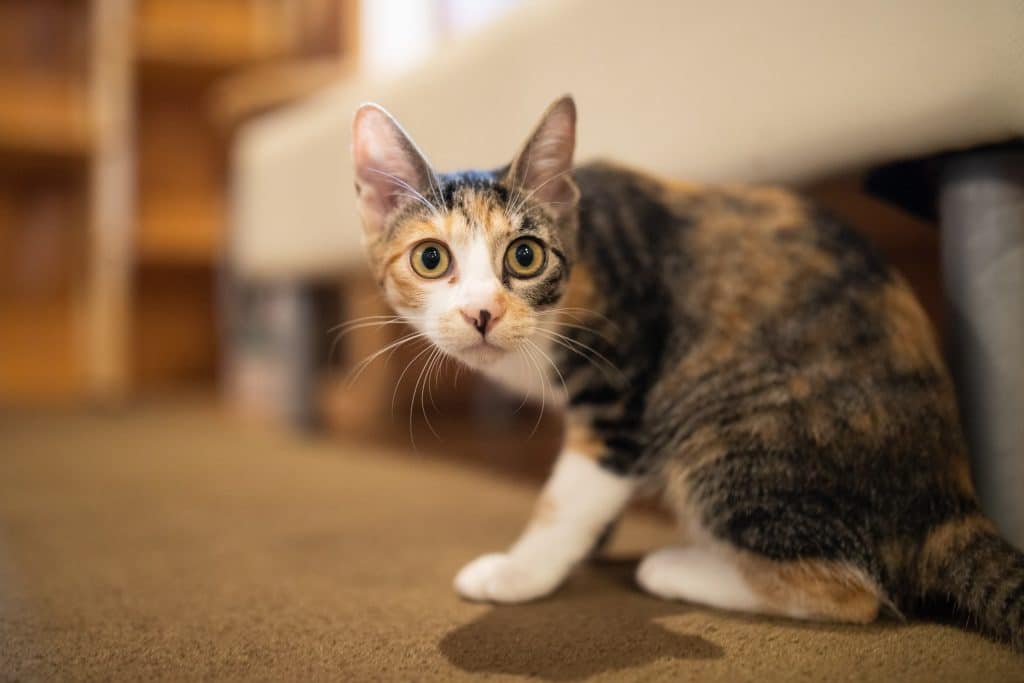
iStock/petesphotography
2. Your cat is afraid
Cats can feel threatened by new things in their environment. They may express their fear of unfamiliar humans, other pets, and even inanimate objects with a hiss. A frightened cat might have dilated pupils, sideways or backward-facing ears, hair on end, twitching or rippling skin, an arched back, and a low, crouching body, Quandt says.
3. Your cat is startled
Hissing is involuntary, Quandt explains. It’s a natural reflex, like a human yelping when frightened or surprised. “Some cats do what I call a ‘startle hiss’, which is their default response in situations where they are startled, but then relax,” he adds.
4. Your cat is stressed
Cats love routine, familiar faces, and familiar places. A change in environment or a new family member could have your cat on edge. Additionally, Ehrlich notes that veterinarians are no strangers to the stress-induced defensive tactics of a cat.
“I’d hiss, too,” she says. “Stuck in a carrier, then in a car, all against my will to a place where there are strange smells…and then someone handles me!” Remember, she adds, it’s not the veterinarian your cat doesn’t like—it’s the stressful situation of leaving their comfort zone.
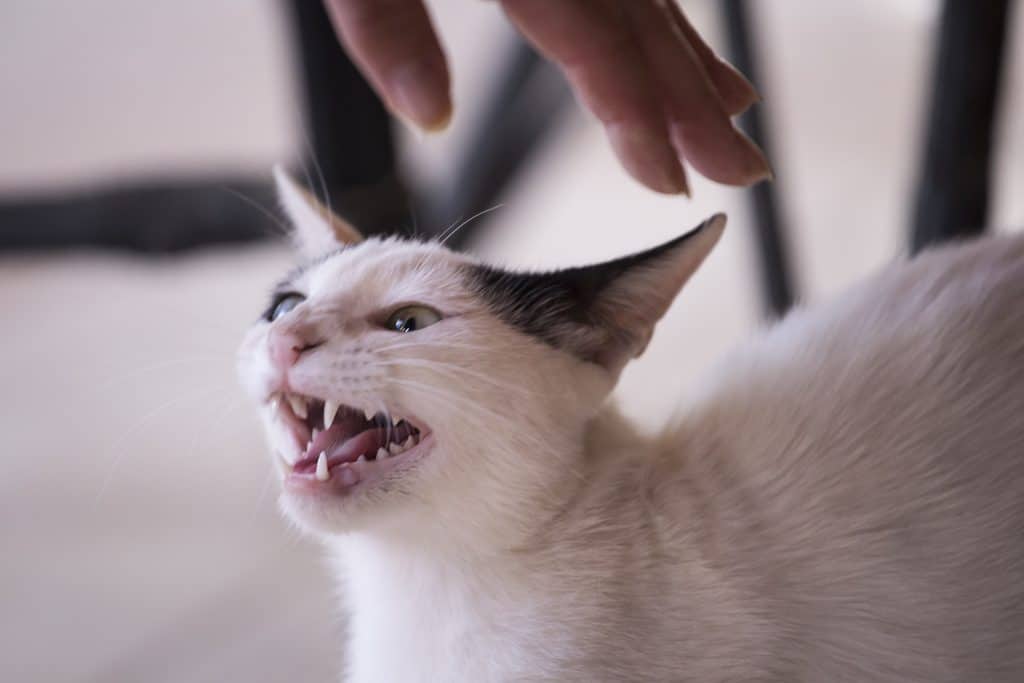
iStock/LexyLovesArt
5. Your cat is in pain
“If your cat is seeking attention, but then responds by hissing or growling when pet, or consistently hissing upon repeated physical stimulation of a certain area, that may be an indication that your cat is experiencing discomfort,” Dr. Samantha Morici, DVM, Head of Veterinary Services at Koala Health, explains.
Other signs a cat is in pain include the following.
- Hiding
- A decrease in activity level
- Change in mobility, such as jumping less frequently or limping
- A lack of appetite
- Rapid breathing
- Dilated pupils
- Squinted eyes
Dr. Pankratz says it can be difficult to differentiate the cause of hissing between pain and fear by body language alone. That’s why she recommends scheduling a checkup at the first sign of a change in behavior.
What Does Cat Hissing Sound Like?
Hissing doesn’t use the vocal cords, Quandt explains. Instead, cats hiss by opening their mouth and expelling air. “The vocalization is voiceless, involuntary, and triggered by the surprise appearance of an enemy,” one study explains. The researchers describe the sound of the hiss as “a drawn-out, low-intensity sound” with an abrupt stop—unlike the hiss of a snake.

iStock/Kseniia Soloveva
What Are The Types Of Cat Hisses?
While hissing is due to a few different scenarios, cats only have one type of hiss, and they can all lead to more confrontation when provoked.
Quandt adds that cats might also make a spitting sound, a more intense variation of a hiss with no saliva being projected. “We believe this sound is universally understood across all major species of animals. It’s like an international warning,” he says. Like a common hiss, the spit is voiceless and involuntary, either following or preceding a hiss.
Hissing vs. growling
First comes the hiss, then the growl. “Both are warnings, and both can precede an attack,” Quandt shares. “But a growl is more serious.” Unlike a snarling hiss, cats growl with their mouth closed or slightly ajar. It’s low-pitched, rumbling, and used to signal danger or scare the aggressor.
Why Do Cats Hiss At Each Other?
Ehrlich says that cats learn to hiss when they’re kittens, around two weeks old. It’s also around this time that socialization with humans is the most important.
“A kitten who hasn’t been well handled by about five to six weeks of age is going to hiss,” Quandt explains. “While the window of socialization is a bit fluid, it gets harder and slower to socialize kittens as they age.”
He adds that hissing is complex and connected to threats, stressors, dominance, and sometimes to social structure. If you hear outdoor cats hissing, the more dominant cat of the colony might be reminding other cats (or kittens) of the social hierarchy.
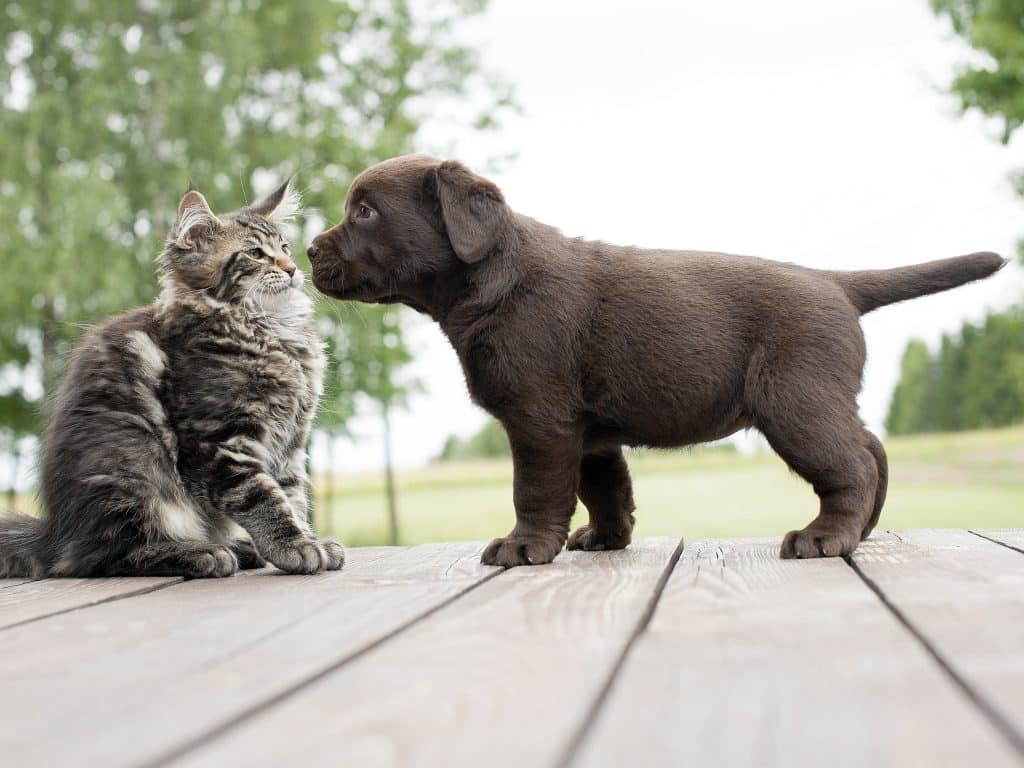
iStock/okeanas
Why Does My Cat Hiss At My Other Pets?
Some cats are naturally afraid of dogs or other pets that may look and smell unfamiliar. When that’s the case, Quandt recommends desensitization and counterconditioning. “Decreasing the distance between Fido and Fluffy during interactions is desensitizing,” he explains. “Pairing a reward like food with the stressor (the dog) is counterconditioning. The reward works on the stressed part of the brain and reduces that stress over time.”
In other situations, the dog may be engaging in behavior that is causing the cat to be afraid. This calls for help from a certified dog trainer and dedicated time socializing your pup with other pets.
Cats who typically get along in a multi-cat household may have a one-off hiss. “Just redirect them with a toy or gently find a way to separate them,” Quandt says. “But don’t discipline them, or you will just make them more stressed.” He adds that if hissing (and conflict) is commonplace in your household, it’s best to ask a professional feline behaviorist for assistance.
Do Some Cat Breeds Hiss More Than Others?
Some breeds of cats are known to be chattier than others, including Siamese, Burmese, Tonkinese, and Japanese Bobtail cats—“with Siamese being the winners,” Quandt notes.
But being a vocal kitty doesn’t always correlate with an increase in hissing. Cats are predators and prey, and an individual cat’s confidence level could teeter toward one end or another. “The ones closer to the bottom (prey) are less confident, and a cat who is less confident may be more likely to hiss,” Quandt says. Of course, life experiences like socialization and living environment play a huge role in how safe and confident a cat feels.
Additionally, Ehrlich notes she’s heard a myth that female cats are less likely to hiss than male cats, which isn’t true. “Both sexes can hiss equally,” she clarifies.
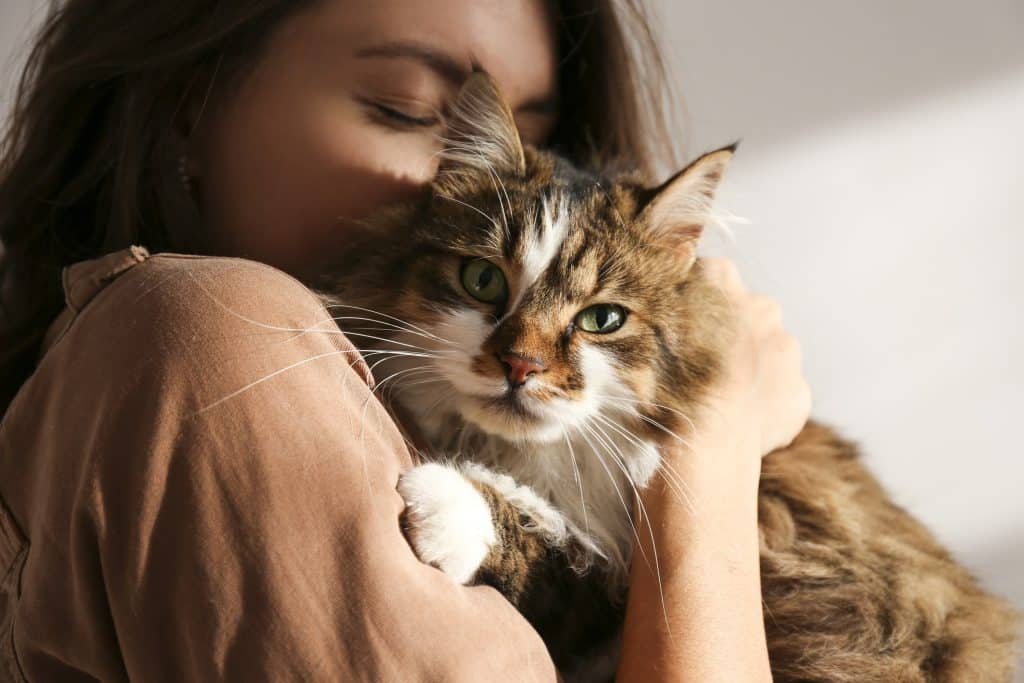
iStock/Evrymmnt
What Should I Do If My Cat Hisses?
Don’t hiss back at your cat if they hiss at you. “They may understand it, and they won’t like it,” Quandt says. “Anything that raises the fear, stress, or confliction of a cat can be thought of as a negative interaction. Hissing at your cat is going to make the situation worse.”
The best thing to do when a cat hisses is to back away and give them the space they’re asking for. Rather than petting your cat or picking them up, talk in a low, soothing voice. Dr. Morici adds to check on your cat after they’ve had time to de-stress.
“Re-approach them and see if the hissing continues,” she says. “If your cat seems to be repeatedly bothered when touched in a certain area, or if the hissing occurs in combination with other behavioral changes, veterinary evaluation is advised.”
Other cats just take some time to learn how to trust. If that’s the case, work on your relationship using positive reinforcement and reducing stress.
How To Make Your Cat Feel Less Stressed
Hissing isn’t about not liking a person; it’s about fear, stress, or anxiety. “Generally, these are temporary, situational emotions,” Quandt says. He adds there are lots of ways to help a cat de-stress and feel more confident.
- Purchase your cat’s essential, basic items. A cat will feel secure and loved when provided with all the essentials for a healthy life, like the appropriate number of litter boxes, fresh water, and complete and balanced meals.
- Provide environmental enrichment. Cats have a natural desire to climb, run, and dig their claws into appropriate surfaces. So, place scratching posts, cat trees, shelving, and window perches in your cat’s favorite spaces.
- Prioritize play and physical enrichment. Cats are natural-born predators who love to exercise their hunting skills with their favorite human at least once a day for about 15 minutes. In between play sessions, provide your cat with puzzle toys, interactive games, and solo toys.
- Give them space to call their own. “Hidey beds can give comfort,” Quandt says. Try cat tents, cubbies, cardboard boxes, and cozy beds and caves.
- Make time to bond. Not all cats like to be picked up and cuddled. Whether it’s quietly sitting next to your cat or a daily grooming session, your cat will appreciate the one-on-one time.
- Use calming pheromones. “These are artificial scents that replicate scents given off by cats,” Quandt explains. They communicate trust and safety.
- Visit the vet regularly. There’s no better way to show your cat love than by providing them with routine medical care. Ehrlich says to reduce stress at the vet’s office, look for a vet who’s gentle and sensitive to your cat’s reactions. Certifications like Fear Free Handling and Feline-Friendly Veterinarian indicate they’ve had special training.
Lastly, Ehrlich says, learn to read your cat’s body language. They’ll tell you what they need to feel safe; we just need to listen or, more importantly, watch for clues.
